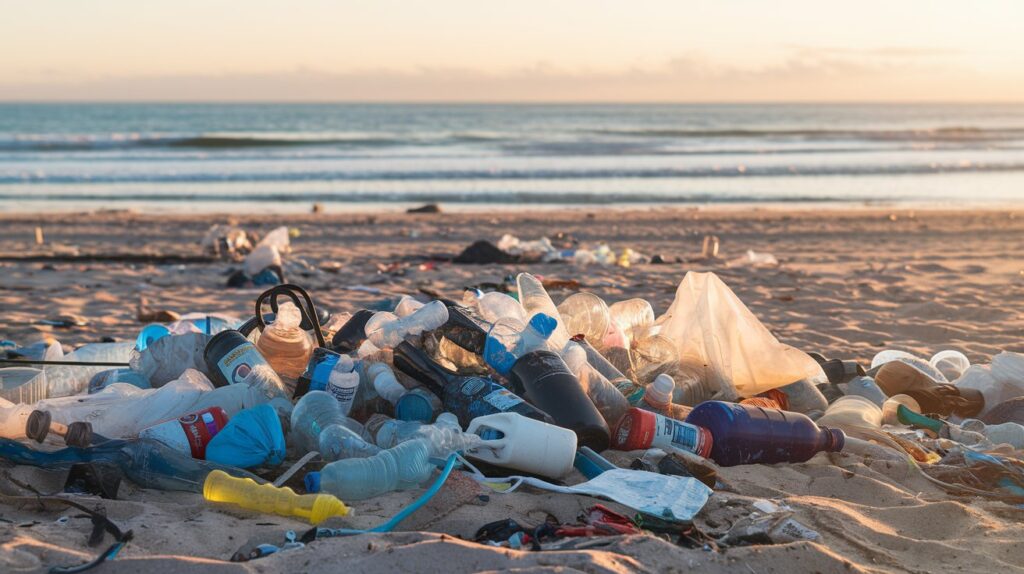Plastic Pollution In The Brazilian Coast Study: Perceptions From Hotel Managers On The Consumption Of Single-Use Plastic Disposals
Introduction Plastic pollution is a growing global concern, representing about 12% of all waste worldwide, with production rapidly increasing. By 2019, plastic production reached 396 million tons annually, equating to about 53 kilograms per person per year. Despite this massive production, only 9% of all plastic produced has been recycled. Brazil alone generates 11.3 million tons of plastic waste per year, making it the fourth-largest producer of plastic waste in the world. Single-use plastics (SUPs), like bottles, cups, and packaging, account for a significant portion of this pollution, with their improper disposal leading to severe ecological impacts, particularly in marine environments. The study aims to explore the perceptions of hotel managers on the Brazilian coast regarding the consumption and management of SUPs, their impact on tourism, and the challenges faced in transitioning to more sustainable practices. By focusing on these stakeholders, who play a direct role in managing tourist interactions with the environment, it seeks to provide insights into the broader implications of SUPs for the tourism industry in Brazil. Impact of Single-Use Plastics on Coastal Tourism The study highlights a range of perspectives from hotel managers on the issue of plastic pollution. While some see it as a significant problem that directly affects the attractiveness of coastal areas, others view it as a minor concern. The majority of managers acknowledge the environmental damage caused by SUPs but note that economic factors often drive decision-making, prioritizing cost savings over ecological considerations. Plastic pollution not only mars the natural beauty of tourist destinations but also imposes high cleaning costs on local businesses. Some hotel managers expressed frustration over the lack of government support for waste management, often leaving them to bear the burden of maintaining clean beaches. These efforts are crucial, as the presence of littered beaches can deter tourists and reduce their overall experience, impacting the local economy. Management of Single-Use Plastics in Hotels All participating hotels reported using SUPs, primarily in the form of cups, bottles, and packaging. However, only a small percentage actively engaged in initiatives to reduce or replace these items. Strategies to manage plastic use included replacing plastic straws with biodegradable alternatives, conducting environmental education for guests and staff, organizing beach clean-up efforts, and implementing internal training programs to reduce plastic use. Despite these efforts, several barriers hinder progress toward sustainable practices. Hotel managers cited the unavailability of cost-effective and high-quality plastic alternatives, resistance from consumers who prefer the convenience of disposables, and a lack of strong leadership and investor support as significant challenges. Additionally, many businesses struggled with implementing circular economy principles, indicating a need for more comprehensive industry changes. The Role of Circular Economy in Addressing Plastic Pollution The study underscores the importance of moving from a linear model of consumption and disposal to a circular economy approach. In a circular economy, products are designed to minimize waste and are either reusable, recyclable, or biodegradable. This shift requires a collective effort involving changes in consumer behavior, innovations in product design, and supportive policies from both the private sector and governments. However, the implementation of circular economy principles in the hospitality industry remains limited due to a lack of understanding and the practical challenges of changing established systems. Many hotel managers were unaware of how to integrate these principles into their operations, indicating a need for more education and advocacy around sustainable practices. Impact of the COVID-19 Pandemic on Plastic Use The COVID-19 pandemic has significantly worsened the issue of plastic pollution. The surge in the use of disposable items like masks, gloves, and single-use packaging has contributed to an increase in plastic waste. This situation presents additional challenges for coastal regions that are already grappling with the impacts of plastic pollution on their ecosystems and tourism activities. The pandemic’s impact on waste generation emphasizes the need for a renewed focus on developing sustainable solutions that balance health and environmental concerns. Efforts to reduce plastic use must adapt to the new reality, incorporating hygiene requirements without compromising on sustainability goals. Recommendations for Sustainable Management of Plastics To address the plastic pollution crisis effectively, the study suggests several key strategies: Conclusion The study provides valuable insights into the challenges faced by coastal hotel managers in Brazil regarding the management of SUPs. While there is a growing awareness of the environmental issues posed by plastic pollution, economic concerns and a lack of alternative solutions hinder significant progress. The COVID-19 pandemic has exacerbated these challenges, increasing the demand for disposable items and complicating efforts to reduce plastic waste. To move towards a more sustainable future, there is a pressing need for broader adoption of circular economy principles, stronger regulations, and a shift in consumer and industry behavior. By addressing these challenges, the hospitality sector can play a pivotal role in reducing plastic pollution and safeguarding the natural beauty of Brazil’s coastal regions for future generations. We want to extend our heartfelt thanks to Jaqueline Gil, our Scientific and Technical Advisory Council member, for allowing us to share this important research. The study, titled “Poluição plástica no litoral brasileiro: percepções de gestores de meios de hospedagem sobre consumo de descartáveis,” was authored by David Leonardo Bouças da Silva, Jaqueline Gil, Elimar Pinheiro do Nascimento, Helena Araújo Costa, and Ravel Paixão. Published in the Revista Brasileira de Pesquisa em Turismo (RBTUR), São Paulo, volume 16, e-2481, in 2022. We appreciate the opportunity to bring greater attention to these valuable findings. We recommend the reading of the full study, that can be accessed here: https://doi.org/10.7784/rbtur.v16.2481. If your organization is facing challenges with plastic pollution and the management of single-use plastics (SUPs), we encourage you to contact us at Green Initiative. Our advisory services supports businesses in adopting sustainable practices, navigating the complexities of waste management, and transitioning to a climate and nature positive circular economy model. By partnering with us, you can overcome these obstacles and take meaningful steps toward reducing your environmental impact while enhancing your climate and nature sustainability credentials. Contact us here. Suggested articles:


